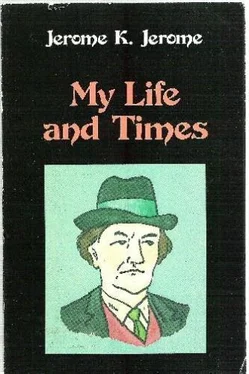Our visits grew more and more frequent, and my mother's hopes for “Papa's Railway” mounted higher and higher. Until one afternoon my sister came back out of the garden empty-handed, and with a frightened look in her eyes. She would not ride home in the carnage. Instead we walked very fast to Dalston Junction, from where we took the train; and I could see that she was crying under her veil. It must have been an afternoon early in November. I remember his having asked my sister if she would like to see the Lord Mayor's show. My mother writes in her diary under date November 16th, “Papa's railway is not to be proceeded with. We are overwhelmed with sorrow. Every effort my dear husband makes proves unsuccessful. We seem shut out from the blessing of God.”
Even my father seems to have lost hope for a while. A page or two later I read, “Dear Jerome has accepted a situation at Mr. Rumbles'. A hundred a year from nine till eight. Feeling very low and sad.”
On November 13th, my mother tells Eliza that she can no longer afford to keep her. “She wept and was very sorry to leave.”
“December 2nd. Jerome had his watch stolen. An elegant gold lever with his crest engraved that I gave him on our wedding day. Oh, how mysterious are God's dealings with us!”
On December 4th, the sun seems to have peeped out. “Dear Blandina's birthday. Gave her my gold watch and a locket. She was very much delighted. Dear Pauline came home. A very pleasant, cheerful day, notwithstanding our heavy trials.” But early the following year it is dark again.
“January 12th. A very severe frost set in this week. Skating by torchlight in Victoria Park. Coals have risen eight shillings a ton. It is a fearful prospect. I have asked the Lord to remove it.”
“January 18th. To-day suddenly , to the surprise of all, a thaw began. The skating by torchlight all knocked on the head. Coals have gone down again just as we were at the last. 'How much better are ye than many sparrows.'”
My sisters seem to have taken situations from time to time. As governesses, I expect: the only calling then open to a gentlewoman. I read: “Pauline to Ramsgate. Oh, how intensely do I wish we could all continue to live together!” And lower down on the same page: “Blanche to Mrs. Turner's. Am feeling so lonely. The briars are too many for my feet to pass through; and the road is rough and dark.”
And then a week or two later, I likewise take my departure, but fortunately only on a brief visit to friends in the north of London. I am seen off at the station. My mother returns to the empty house and writes, “Dear Luther went off delighted. Gracious Father, guard and protect my little lamb until he returns.”
Writing the word “Luther” reminds me of an odd incident. I was called Luther as a boy, not because it was my name, but to distinguish me from my father, whose Christian name was also Jerome. A year or two ago, on Paddington platform, a lady stopped me and asked me if I were Luther Jerome. I had not heard the name for nearly half a century; and suddenly, as if I had been riding Mr. Wells' Time Machine backwards, Paddington station vanished with a roar (it may have been the pilot-engine, bringing in the 6.15) and all the dead were living.
It turned out we had been playmates together in the old days at Poplar. We had not seen each other since we were children. She admitted, looking closer at me, that there had come changes. But there was still “something about the eyes,” she explained. It was certainly curious.
For some reason, about this time, there seems to have crept into my mother's heart the hope that we might get back possession of the farm in Devonshire to which my father had brought her home after their honeymoon, and that she might end her days there. It lies on the north side of the river above Bideford, and is marked by a ruined tower, near to which, years ago, relics were discovered proving beyond all doubt that the Founder of our House was one “Clapa,” a Dane, who had obtained property in the neighbourhood about the year Anno Domini one thousand. It was Clapa, I take it, who suggested our family crest, upraised arm grasping a battle-axe, with round about it the legend “Deo omnia data.” But as to how much Clapa owed to God and how much to his battle-axe, found rusted beside his bones, history is silent. Be all this as it may, my mother never seems to have got over the idea that by some inalienable right the farm still belonged to us. Always she speaks of it as “our farm.” Through the pages of her diary one feels her ever looking out towards it, seeing it as in a vision beyond the mean streets that closed her in, and among which in the end she died. One day she writes: “Dear Jerome has told me about Norton and our farm. Why should it not be? With God all things are possible.” Later on, a large hamper arrives from Betsey, the farmer's wife. Betsey in my mother's time had been the dairymaid; and had married the carter. With the hamper, Betsey sends a letter containing further news concerning Norton—whoever or whatever “Norton” may be. My mother writes: “Well, God can restore even that to us. Oh, that I had more faith in God!”
Among all their troubles, one good thing seems to have been left to my father and mother: their love for one another. It runs through all the pages. There was a sad day when my sister Pauline lay dangerously ill. My mother returns from a visit to her.
“Gracious Father, sustain me that I may never distrust Thee, though wave follow wave in overwhelming succession. Came home with Papa, whose love is so constant and true. Mrs. Cartwright sent some apples and a can of cream, and Mrs. E. a pair of boots for Luther. 'His mercy endureth for ever.'”
“May 2nd, 1865. Dear little Luther's birthday. Six years old. Gave him a dove. Papa gave him 'Robinson Crusoe.'”
About this time, and greatly to my mother's joy, I “got religion,” as the saying is. I gave up taking sugar in my tea, and gave the twopence a week to the Ragged School in Threecolt Street. On Sundays, I used to pore over a great illustrated Bible and Fox's “Book of Martyrs.” This used to be a popular book in religious houses, and children were encouraged to wallow in its pictures of hideous tortures. Old Fox may have meant Well, but his book makes for cruelty and lasciviousness. Also I worried myself a good deal about Hell. I would suggest to our ecclesiastical authorities that they should make up their mind about Hell and announce the result. When I was a boy, a material Hell was still by most pious folks accepted as fact. The suffering caused to an imaginative child can hardly be exaggerated. It caused me to hate God, and later on, when my growing intelligence rejected the conception as an absurdity, to despise the religion that had taught it. It appeared one could avoid Hell by the simple process of “believing.” But how was I to be sure that I did believe, sufficiently? There was a mountain of rubbish on some waste land beside the Limehouse canal: it was always spoken of locally as the “mountain.” By way of experiment, I prayed that this mountain might be removed. It would certainly have been of advantage to the neighbourhood; and as, by comparison with pictures I had seen, it was evidently but a very little mountain, I thought my faith might be sufficient. But there it remained morning after morning, in spite of my long kneelings by my bedside. I felt the fault was mine and despaired.
Another fear that haunted me was the Unforgivable Sin. If only one knew what it was one might avoid it. I lived in terror of blundering into it. One day—I forget what led to it—I called my Aunt Fan a bloody fool. She was deaf and didn't hear it. But all that night I lay tossing on my bed. It had come to me that this was the Unforgivable Sin, though even at the time, and small though I was, I could not help reflecting that if this were really so, there must in the Parish of Poplar be many unforgivable sinners. My mother, in the morning, relieved my mind as to its being the particular Unforgivable Sin, but took it gravely enough notwithstanding, and kneeling side by side in the grey dawn, we prayed for forgiveness.
Читать дальше










